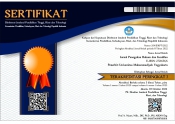Monopoly Analysis of a Limited Liability of State-Owned Enterprises (SOEs)
DOI:
https://doi.org/10.18196/jphk.v3i2.15825Keywords:
Holding Company, Monopoly, PrivatizationAbstract
Monopoly is regulated in the regulation of State-Owned Enterprises (SOEs) as the right to regulate (bestuur) all state resources as mandated by the constitution of Article 33 of the 1945 Constitution and also the BUMN Law Number 19 of 2003 where one of them is a company that is an entity a government-owned business in the form of a limited liability company. The capital is divided into wholly or at least 51 percent of the shares owned by the Republic of Indonesia with the main objective of pursuing profit. In the case of SOEs, corporate actions are determined by the direction of state policies in their economy. Problem formulation based on the above background, is monopolistic and de-monopoly practices against SOEs, inconsistency of the government? This research used normative juridical with a quantitative analytical approach and examines literature studies that conclude. The study results showed that corporate action was not doubt or inconsistency in implementing a state monopoly. However, this holding was to increase the capacity and existence of SOEs as agents of development and the state in managing resources related to many people’s lives.References
Anggoro, T. (2020). Monopoli & BUMN. Retrieved from https://kppu.go.id/wp-content/uploads/2020/09/Materi-TeddyAnggoro-MonopoliBUMN.pdf
ANT. (2016). KPPU: Banyak Kebijakan Pemerintah Muluskan Monopoli. Retrieved from hukumonline.com website: https://www.hukumonline.com/berita/a/kppu--banyak-kebijakan-pemerintah-muluskan-monopoli-lt582dabf0e432c
Bergsager, H., & Korppoo, A. (2013). China’s State-Owned Enterprises as Climate Policy Actors. Copenhagen. https://doi.org/10.6027/TN2013-527
Coşar, B., Yilmaz, H., & Altindağ, E. (2019). The Role of State‐Owned Enterprises in an Artificial Monopoly Market: The Case of Turkey. American Journal of Economics and Sociology, 78(5), 1171–1199. https://doi.org/10.1111/ajes.12299
FHC/ESP. (2022). Menyikapi Monopoli dan Dominasi BUMN. Retrieved from uii.ac.id website: https://www.uii.ac.id/menyikapi-monopoli-dan-dominasi-bumn/
Islami, T. A. (2019). Penetapan Standardisasi Harga oleh Asosiasi Pelaku Usaha (Trade Association) dalam Perspektif Hukum Persaingan Usaha di Indonesia. IRTIFAQ: Jurnal Ilmu-Ilmu Syariah, 6(2).
Lubis, A. F., Anggraini, A. M. T., Toha, K., Kagramanto, L. B., Hawin, M., Sirait, N. N., … Silalahi, U. (2009). Hukum Persaingan Usaha Antara Teks & Konteks (A. F. Lubis & N. N. Sirait, Eds.). Indonesia: GTZ KPPU.
Organisation for Economic Co-Operation and Development. (2018). Arrangment on Officially Supported Export Credits. Retrieved from http://www.oecd.org/officialdocuments/publicdisplaydocumentpdf/?cote=TAD/PG(2018)1&docLanguage=En
Permadi, I. B. K. B., & Sukranatha, A. . K. (2015). Konsep Rule of Reason untuk Mengetaui Praktek Monopoli. Kertha Semaya : Journal Ilmu Hukum, 3(3), 1–6.
Rangkuti, P., Syamsah, T. ., & Yani, A. (2019). Praktek Larangan Monopoli Dan Persaingan Usaha Tidak Sehat Pada Bank Pemerintah Dalam Memberikan Fasilitas Subsidi Perumahan. Jurnal Ilmiah Living Law, 11(2), 116–130. https://doi.org/10.30997/jill.v11i2.2112
Samawati, P. (2018). Monopoli BUMN dalam Perspektif Hukum Persaingan Usaha. Malang: Tunggal Mandiri.
Shanghai Daily. (2013). Experts Call for Break-up of SOE Monopoly. Shanghai Daily. Retrieved from http://www.china.org.cn/business/2013-05/29/content_28964295.htm
Sipayung, J. F., Nasution, B., & Siregar, M. (2013). Tinjauan Yuridis Holdingisasi BUMN dalam Rangka Peningkatan Kinera menurut Perspektif Hukum Perusahaan. TRANSPARENCY, 1(1).
Sirait, N. N. (2006). Indonesia dalam Menghadapi Persaingan Internasional. Medan: Fakultas Hukum Universitas Sumatera Utara. Retrieved from https://repository.usu.ac.id/bitstream/handle/123456789/20527/ppgb_2006_ningrum_natasya_sirait.pdf?sequence=2&isAllowed=y
Songmin, G. (2013). China’s SOE Monopoly Fallacy. Retrieved from china.org.cn website: http://www.china.org.cn/opinion/2013-06/03/content_29010446.htm
Suartini, S., & Syafrizal, S. (2021). Al-Ghazali on Social Welfare: In Search of its Relevance in the Context of Village Owned Enterprise. Al-Risalah: Forum Kajian Hukum Dan Sosial Kemasyarakatan, 21(1), 83–95. https://doi.org/10.30631/alrisalah.v21i1.647
Susanto, V. Y. (2020). KPPU minta pemerintah perjelas pengecualian monopoli bagi BUMN. Retrieved from Kontan.co.id website: https://nasional.kontan.co.id/news/kppu-minta-pemerintah-perjelas-pengecualian-monopoli-bagi-bumn
Tanaya, P. E. (2016). Divestasi sebagai Alternatif Mempertahankan Viabilitas Perekonomian Indonesia (Dari Perspektif Economic Analysis of Law). Jurnal Advokasi, 6(2), 231–246.
Tjokrowasito, M. (2009). Kebijakan Persaingan Pada Industri Jasa Penerbangan. Jakarta: BAPPENAS.
Wareza, M. (2021). Holding Ultra Mikro Disebut Bakal Monopoli, Ini Kata Erick. Retrieved from CNBC Indonesia website: https://www.cnbcindonesia.com/market/20210318174211-17-231235/holding-ultra-mikro-disebut-bakal-monopoli-ini-kata-erick
Regulation
Komisi Pengawas Persaingan Usaha. Peraturan Komisi Pengawas Persaingan Usaha Nomor 3 Tahun 2010 tentang Pedoman Pelaksanaan Ketentuan Pasal 51 Undang-Undang Nomor 5 Tahun 1999 tentang Larangan Praktek Monopoli dan Persaingan Usaha Tidak Sehat. (2010).
Presiden Republik Indonesia. Peraturan Presiden Republik Indonesia Nomor 4 Tahun 2016 tentang Percepatan Pembangunan Infrastruktur Ketenagalistrikan. (2016). Republic of Indonesia: Lembaran Negara Republik Indonesia Tahun 2016 Nomor 8.
Downloads
Published
Issue
Section
License
Copyright statementAuthors who publish with JURNAL PENEGAKAN HUKUM DAN KEADILAN agree to the following terms:
- Authors retain copyright and grant the journal right of first publication with the work simultaneously licensed under a Creative Commons Attribution License that allows others to share the work with an acknowledgement of the work's authorship and initial publication in this journal.
- Authors are able to enter into separate, additional contractual arrangements for the non-exclusive distribution of the journal's published version of the work (e.g., post it to an institutional repository or publish it in a book), with an acknowledgement of its initial publication in this journal.
- Authors are permitted and encouraged to post their work online (e.g., in institutional repositories or on their website) prior to and during the submission process, as it can lead to productive exchanges, as well as earlier and greater citation of published work (See The Effect of Open Access).
- Share — copy and redistribute the material in any medium or format
- Adapt — remix, transform, and build upon the material
- Attribution — You must give appropriate credit, provide a link to the license, and indicate if changes were made. You may do so in any reasonable manner, but not in any way that suggests the licensor endorses you or your use.
- NonCommercial — You may not use the material for commercial purposes.
- ShareAlike — If you remix, transform, or build upon the material, you must distribute your contributions under the same license as the original.
- No additional restrictions — You may not apply legal terms or technological measures that legally restrict others from doing anything the license permits.

JPHK is licensed under a Creative Commons Attribution-NonCommercial-ShareAlike 4.0 International License.

